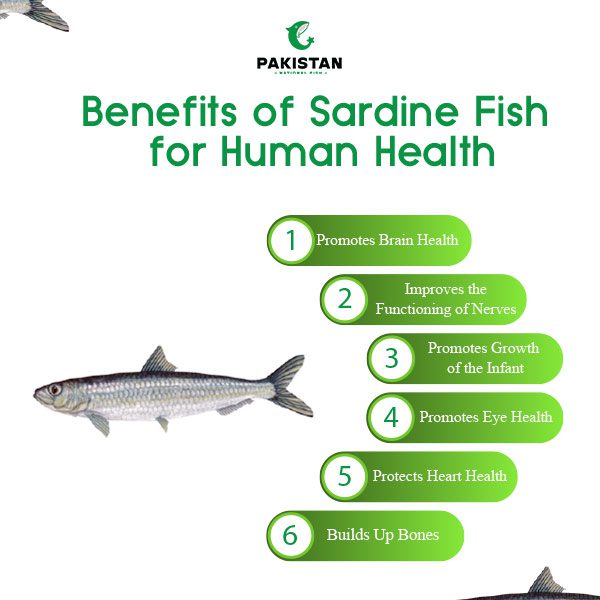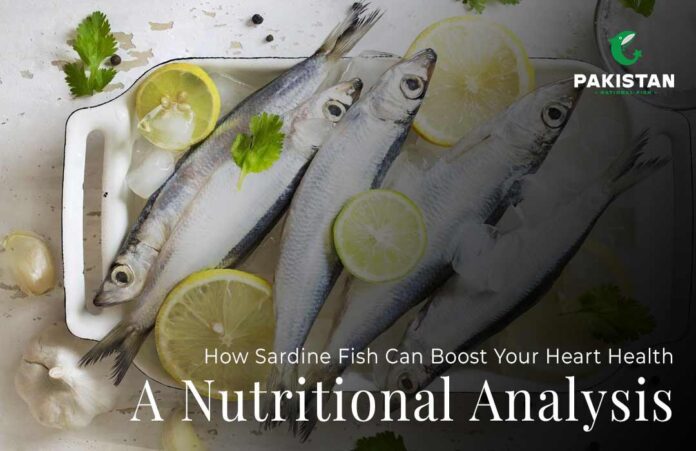Sardines are tiny fish that may grow up to 25 centimetres (almost 10 inches) long. They dwell in groups called schools throughout the world’s waters. The soft and oily flesh of Sardine fish is commonly eaten canned or grilled, but it may also be prepared in a variety of ways.
Sardines have been a staple of indigenous cuisine for generations in India, the Philippines, Portugal, and other Mediterranean nations. The fish has high levels of omega-3 fatty acids, which lower the risk of heart disease and behavioural issues.
Benefits of Sardine Fish for Human Health

1. Protects Heart Health
A Harvard research discovered that eating one to two meals of canned sardines each week delivers enough omega-3 oil fatty acids to minimise your risk of heart disease by more than one-third.
Heart disease is the number one cause of death in the United States. Sardines include potassium, magnesium, and zinc, which may help decrease blood pressure and improve blood lipids.
2. Promotes Growth of the Infant
Sardines include omega-3 fatty acids, which have been demonstrated to help a fetus’s brain and neurological system develop normally. Babies of moms who ingest less omega-3 have a higher risk of delayed brain development.
Sardines, when consumed consistently, can help decrease inflammation caused by a range of conditions. Inflammation can cause a variety of issues that exacerbate other disorders, such as arthritis.
3. Promotes Brain Health
When paired with other lifestyle adjustments, best sardines and other fish high in omega-3 fatty acids have been demonstrated to help enhance grey matter in the brain. An increase in grey matter may aid in the prevention of some neurological illnesses.
However, the study that supports this was rather small and focused on healthy individuals. Further study may be required to establish a direct correlation.
4. Promotes Eye Health
5. Builds Up Bones
When you consume tinned sardines, you eat the fish bones and skin, which are a good source of calcium, supplying almost one-third of what the average person requires in each serving.
Vitamin D is essential for this process because it enables your body to absorb calcium. Sardines have considerably more vitamin D than calcium.
6. Improves the Functioning of Nerves
Up to 40% of elderly persons might be low in vitamin B12. This deficit can lead to impaired sensory nerve function and peripheral nerve disorders. Nerve disorders can lead to additional difficulties.
They may decrease your movement, causing you to fall and sustain significant injuries. A serving of sardines has more than three times the amount of B12 that most individuals require.
Potential Risks of Eating Sardines
1. Mercury Toxins
Mercury is one of the most toxic contaminants typically found in fish, especially sardines. High levels of mercury can harm nerves in adults and have devastating consequences for young children’s development.
However, multiple studies have shown that the low quantity of mercury present in sardines poses a negligible danger to consumers, even pregnant women who were previously recommended to avoid fish during pregnancy due to potential pollutants.
2. Heavy Metal Pollution
Sardines may be polluted with heavy metals other than mercury, such as cadmium and lead. According to one research in Algeria, the levels of these heavy metals in sardines are above the European threshold values. Another research examined a broader list of hazardous elements found in Brazilian sardines. It was discovered that most components were present at safe levels.
However, amounts of barium, iron, and selenium are above the permissible values for youngsters. The findings indicated that eating canned sardines from Brazil regularly may not be safe. You should investigate the origin of your sardines and take precautions to guarantee they are safe for consumption.
3. Increased Sodium Consumption
Canned sardines are high in sodium. A single serving contains around 282 milligrams of sodium, which is nearly 12% of the daily required requirement. If you have high blood pressure, you should avoid salt since it draws water and increases blood volume in your body.
Table salt, or sodium chloride, is acceptable in moderation, but you should restrict your intake. If you need to cut back on salt, you may still enjoy sardines by serving them in smaller portions and keeping the rest of your meal low-sodium.
How to Eat Sardines
Sardines have a salty, moderately fishy flavour, which may be overpowering if you’re not used to eating seafood. However, many people enjoy adding sardines to give a salty flavour to foods like pasta and soups, and their flavour may be muted by combining sardines with other ingredients such as herbs and lemon juice.
Here are a few ways to eat sardines:
- Sardines may be used in pasta and grain recipes.
- Use Sardines in tomato sauce to top pizza and flatbread.
- Enjoy sardines with crackers.
- Toss canned sardines in oil with salads.
For a nutrient-dense tuna fish salad alternative, combine sardines, diced celery, and mayonnaise. Sardines complement most savoury foods and may be substituted with nearly any fish. Although canned sardines are more popular in the United States, certain fish markets and supermarkets sell fresh sardines that may be grilled, baked, or sautéed.
Sardines are canned in a variety of ways, including in oil, tomato sauce, and water, which might alter their nutritional content. They can be bought with or without bones.
CONCLUSION
Sardines are a very nutritious and diverse meal with several health advantages, notably for heart health, thanks to their high omega-3 fatty acid concentration. These fatty acids lower blood pressure and improve cholesterol levels, which reduces the risk of heart disease. Sardines also promote brain health, bone strength, and nerve function.
However, possible dangers such as mercury and heavy metal pollution, as well as excessive salt levels, should be noted, particularly when eating canned sardines. By selecting high-quality sardines and eating them in moderation, you may get many health advantages while minimising hazards.


